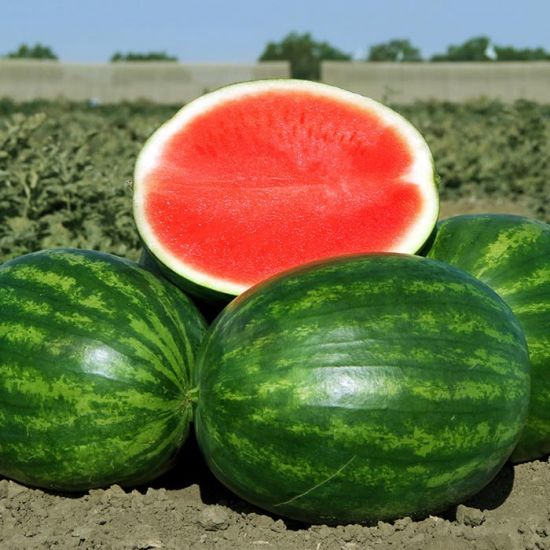Troubadour (Watermelon/triploid)
Latin Name: Citrullus lanatus
Item #: 1990175
Maturity:
80 Days
Difficulty:
Easy
Orders of 1,000 seeds and over require a signed waiver. Stokes Seeds Watermelon Waiver
80 days. 14 lb/6 kg blocky Crimson Sweet type with excellent deep red interiors. High Brix. Minimum order is 1,000 seeds.
WATERMELON - SEEDLESS - Hybrid Triplold
Approx. 2 lbs/908 g per acre (Triploid plus pollinator) Approx. 3300 plants per acre on 80 inch beds or 3100 plants per acre on 84 inch beds. (Recommend 2 bee hives per acre)
Hybrid triploid watermelons are commonly referred to as seedless but nature must cooperate to make this phenomena true. Although called seedless this species does have the initial thin white membranes like seedless cucumbers which resemble seed and are edible. However if the plants are severely stressed by lack of water, severe temperature swings or lack of bees to pollinate the plants, you will get normal seeds forming inside the watermelons. This species does not provide or produce enough pollen to cause the plants to set fruit, so a pollinator must be planted near each triploid plant. These seeds are stained green for easy recognition.
COMMERCIAL GROWERS should set out their fields in contrasting rows in a 2 to 1 ratio, i.e. 2 rows of triploid with the 1 row of pollinator planted between the two rows of seedless. Naturally the pollinator will have seed. Bee hives should be added (2 per acre) to guarantee pollination. Cold weather of course will cause the bees not to work and poor pollination will occur. For this reason we recommend that smaller plantings use a higher percentage of pollinator (2 rows of pollinator to one of triploid) to make sure the seedless are properly pollinated if bees are scarce.
TIMING the two species to reach flowering time together is vital. Usually the first fruit set on seedless types have experienced some stress so they may be misshapen or contain seed. You can avoid this by starting the seedless or triploid about April 15th indoors in pots and delay seeding the pollinator till May 1st., indoors in pots. In this way the pollinator will delay producing pollen until the first set of triploids drop off. Usually in the north direct seeding (outdoor seeding) is impractical.
GREENHOUSE: Start seed indoors from Apr. 15th - May 1st (no later) in 3 in/7.5 cm peat pot strips; 0.5 in/13 mm deep, 2 or 3 seeds per pot. Soil temperature is critical, seed requires 75-80°F/26°C temp. for 5-10 days for maximum germination. Use luke warm water to prevent the lowering of soil temps. Seeds will not sprout properly in 60°F/16°C soil. Grow plants in 70°F/21°C air temp. (minimum). Reduce air temp. to 60°F/16°C seven days before setting plants into the field. Wait until the ground warms up before transplanting at least 15 days after your last spring frost. We plant ours about June 15th. Plants will grow more rapidly while protected in the greenhouse from those cold June nights than outside in the cold soil. Don't rush it! Some growers use black plastic over each row with the edges covered and plants are then transplanted through holes. Space plants in rows 2 ft/61 cm apart. Soak transplants and peat pots with good starter solution of 10-52-17 @ 4 lbs/2 kg per 50 gal/228 liters of water) before transplanting. Never move the vines when cultivating, shallow root systems follow the vine growth. Fertilize at least twice, 10 days after transplanting with 20-20-20, keeping at least 4 in/10 cm away from the center of the row. All vine crops depend on insects to transfer pollen from male to female blooms.
HARVEST in August, when the rind underneath the melon turns from white to pale yellow.

